The Fourth Serbian International Conference on Applied Artificial Intelligence (AAI2025)
Dear Madam/Sir,
It is our great pleasure to invite you to the Fourth Serbian International Conference on Applied Artificial Intelligence (AAI2025) which will be held at Zlatibor, Serbia, on May 29th – 30th, 2025.
Zlatibor
Zlatibor is a mountain region situated in the western part of Serbia, a part of the Dinaric Alps. It is considered the Serbian capital of mountain tourism as it is rich with content for everyone. Situated only 27km from Užice, a town where part of the University of Kragujevac is located, this mountain offers a perfect blend of pure nature and luxurious resorts. Location of the conference will be at Hotel Queen of Zlatibor.
Conference
AAI2025 program includes keynote lectures of international experts, panel discussions, mini-symposia and prearranged virtual 1:1 meetings with 200+ participants from all over the world.
AAI2025 welcomes abstracts in all sub-areas of artificial intelligence. Moreover, the conference aims to provide a platform for researchers and practitioners from both academia and industry to share the information about cutting-edge developments in the field of artificial intelligence.
This conference intends to emphasize a research connection; therefore, authors are invited to highlight the advantages of information technologies in various domains. Innovative research ideas on how to solve problems using artificial intelligence, both in R&D and real-time applications are welcome. Papers describing the advanced prototypes, systems, methodologies, tools and techniques and general survey papers, which indicates future directions, are also encouraged.
Important Dates
- Deadline for the submission of scientific contributions (1-page abstract or minimum 6 pages full paper, in MO Word): April 25th, 2025
- Deadline for the notification of acceptance: April 30th, 2025
- Deadline for early bird registration fee payment: May 10th, 2025
Manuscript Submission
Submit your abstract on one page (docx format only) through our online submission system at the following LINK.
Plenary Speakers
- Prof. Borko Furht – Florida Atlantic University, Boca Raton, Florida, USA; Title: Collaborative Innovation in AI: Partnerships Between Academia, Industry, and Government.
- Prof. David Naccache – ENS’ Information Security Group, Paris, France; Title: Using AI to Discover Conjectures – The Balkans Continued Fraction Example.
- Prof. Freddy Gabbay – VLSI Research Lab, The Institute of Applied Physics, The Hebrew University of Jerusalem; Title: AI at the Edge of Precision: Accelerating AI Efficiency with Approximate Computing.
- Prof. Zoran Bosnić – University of Ljubljana, Ljubljana, Slovenia; Title: The Road to General AI in Medicine: The Promise and Challenges.
- Prof. Naphtali Rishe – The inaugural Outstanding University Professor, Florida International University, USA; Title: Generative AI for Robust Map Generation from Satellite Imagery.
- Prof. Hermann Maurer – Fakultät für Informatik und Biomedizinisch Technik, Institut für Human-Centered Computing (HCC), Graz University of Technology, Austria; Title: Large Documents Must Allow More than Passive Reading.
- Prof. Alexander D. Stajković – Dean’s Professor in Business, University of Wisconsin-Madison, School of Business, USA; Title: The Role of AI in Outdating Homo Sapiens.
- Prof. Veljko Milutinović – Life Fellow of the IEEE, Washington, D.C., USA Member, a Former Trustee and Treasurer, Academia Europaea, London, GBR Founding Member, Serbian National Academy of Engineering, Beograd, SRB Foreign Member, Montenegrin National Academy of Sciences and Arts, Montenegro; Title: Digital Preservation of Family Heritage Enhanced Using Artificial Intelligence.
- Prof. Kyoung Mu Lee – Dept. of ECE, Seoul National University (SNU), Seoul, South Korea; Title: 3D Computer Vision: Reconstruction, Generation, and Manufacturing.
- Prof. Panos Razis – University of Cyprus, Nicosia, Cyprus; Title: On the Mission of the Cosmos University in Data Science and Artificial Intelligence.
- Prof. Gerhard Klimeck – Purdue University, West Lafayette, USA; Title: The Mission of NanoHUB.
- Prof. Luca Benini – University of Bologna, Bologna, Italy; Title: Open Platforms for the Embodied AI era.
- Prof. Onur Mutlu – ETH, Zurich, Switzerland; Title: Fundamentally Accelerating Genome Analysis.
- Prof. Jon Eckhardt – University of Wisconsin, USA; Title: On the Mission of the University of Wisconsin in the Domain of Entrepreneurship and Discovery.
Prof. Borko Furht
Florida Atlantic University, Boca Raton, Florida, USA
Title: Collaborative Innovation in AI: Partnerships Between Academia, Industry, and Government

Abstract
In this presentation, we explore the critical role of collaborative innovation in AI, emphasizing the importance of partnerships between academia, industry, and government. We highlight a successful model of cross-sector collaboration through the NSF-sponsored Industry/University Cooperative Research Center for Advanced Knowledge Enablement, which boasts 45 industry members and supports over 50 applied research projects. We will showcase real-world examples of how these partnerships drive technological advancements and address complex societal challenges. Additionally, we will discuss successful projects led by our faculty and students that have resulted in start-up companies, patent inventions, and commercially successful products and services. By examining these case studies, we aim to demonstrate how structured collaboration fosters innovation and maximizes the impact of AI and emerging technologies.
Biography
Prof. Borko Furht is a Professor in the Department of Electrical & Computer Engineering and Computer Science (CEECS) at Florida Atlantic University (FAU) in Boca Raton, Florida. He also serves as the Director of the NSF-sponsored Industry/University Cooperative Research Center on Advanced Knowledge Enablement at FAU. From 2010 to 2013, he chaired the CEECS Department, and from 2002 to 2009, he led the Computer Science and Engineering Department at FAU. Additionally, from 2006 to 2008, he served as Senior Assistant Vice President for Engineering and Technology at FAU. Before joining academia, he held leadership roles in industry, including Vice President of Research and Senior Director of Development at Modcomp, a Daimler-Benz-owned technology company in Fort Lauderdale. He was also a professor at the University of Miami and a senior researcher at the Institute Boris Kidrič-Vinča in Yugoslavia. Professor Furht earned his Ph.D. in Electrical and Computer Engineering from the University of Belgrade. His research spans multimedia systems, big data, video coding, wireless multimedia, cloud computing, and social networks.
As Principal Investigator (PI) and Co-PI, he has led multiple multi-year, multi-million-dollar projects, securing $25 million in funding from agencies such as the NSF, NIH, Department of Navy, DoD, and NASA, as well as private-sector leaders like IBM, Google, Apple, LexisNexis, Motorola, and Emerson. He is the author of numerous books and research articles in multimedia, computer architecture, real-time computing, and operating systems. He holds 125 U.S. and international patents in video coding, with 13 patents being essential to the new VVC/H.266 video coding standard. Professor Furht is the founder and Editor-in-Chief of the Journal of Multimedia Tools and Applications (Springer) and co-founder of the Journal of Big Data (Springer). His contributions have earned him multiple technical and publishing awards, as well as consulting roles with companies such as IBM, Hewlett-Packard, Xerox, General Electric, NASA, JPL, Honeywell, and RCA.
Recognized as FAU’s Researcher of the Year in 2013 and 2019, he also received the FAU President’s Award for Career Achievements in 2024. He has served as Chairman and Director on the Board of several high-tech companies and has worked as an expert witness for Cisco, Qualcomm, Adobe, and Bell Canada. He is a member of the European Academy of Science (Academia Europaea) and serves as Special Advisor for Technology and Innovation for the United Nations Global Millennium Development Foundation.
Prof. David Naccache
ENS’ Information Security Group
Paris, France
Title: Using AI to Discover Conjectures – The Balkans Continued Fraction Example

Abstract
Using AI in experimental mathematics is a thrilling area of exploration. In this paper we explore using AI the properties of a specific family of continued fractions involving Catalan’s constant. Our main result is a stunning machine-generated closed formula allowing to compute those continued fractions. Having distinguished different cases associated to regions in the plan, we nickname those continued fractions \enquote{The Balkans} as they divide into areas which are related but still different in nature. Because we do not provide formal proofs of those machine-constructed formulae we do not claim them to be theorems. Still, each and every proposed formula was extensively tested numerically to hundreds of decimals.
Biography
Prof. David Naccache heads the ENS’ Information Security Group. His research areas are code security, forensics, experimental mathematics, AI for security and the automated and the manual detection of vulnerabilities. Before joining ENS Paris (PSL) he was a professor during 10 years at Université Panthéon-Assas. He previously worked for 15 years for Gemplus (now Thales), Philips (now Oberthur) and Thomson (now Technicolor). He studied at Université Paris 13 (BSc), Université Paris 6 (MSc), IMAC (Eng), Telecom ParisTech (PhD), Université Paris 7 (HDR), and IHEDN. He is a forensic expert by several courts, the incumbent of the CyberSecurity chair at the Military Academy of the National Gendarmerie. He is a member of the Institut universitaire de France, the inventor of about 180 patent families and the author of more than 300 scientific publications.
Prof. Freddy Gabbay
VLSI Research Lab
The Institute of Applied Physics
The Hebrew University of Jerusalem
Title: AI at the Edge of Precision: Accelerating AI Efficiency with Approximate Computing
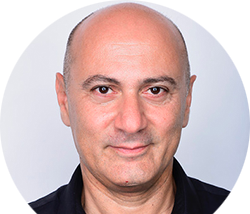
Abstract
The rapid evolution of Generative AI models has ushered in groundbreaking advancements across industries, but their ever-increasing complexity presents a critical challenge: the need for efficient and scalable hardware accelerators. As model sizes grow exponentially, traditional computing paradigms struggle to meet the demands for higher performance, lower latency, and reduced energy consumption—particularly at the edge, where resource constraints are more pronounced. This talk explores how innovative microarchitectural approaches can unlock new frontiers for Generative AI computing. Central to this vision is the integration of approximate computing techniques, which embrace the trade-off between precision and efficiency to deliver significant gains in hardware efficiency and power savings with relatively negligible compromise in model accuracy. By leveraging decomposition, dynamic scheduling, and value-based computing, we can optimize execution efficiency, prioritize critical computations, and reduce redundancy, paving the way for next-generation AI accelerators. The talk will also highlight the role of these approaches in enabling efficient Generative AI at the edge, where constraints on power, latency, and hardware resources are most acute.
Biography
Prof. Freddy Gabbay is the head of the VLSI Systems Lab at the Institute of Applied Physics at the Hebrew University of Jerusalem. His research focuses on VLSI design, microelectronics, computer architecture, machine learning, and domain-specific accelerators. Prof. Gabbay received his B.Sc., M.Sc., and Ph.D. in Electrical Engineering from the Technion – Israel Institute of Technology, Haifa, Israel. His professional career spans over more than two decades of leadership roles in both academia and industry. In 1998, he began his career as a researcher at Intel’s Microprocessor Research Lab. The following year, he joined Mellanox Technologies, where he contributed to the architecture and ASIC design of their switch product line. In 2003, he moved to Freescale Semiconductor as a senior design manager, leading the development of baseband ASIC products. In 2012, he returned to Mellanox Technologies, serving as Vice President of Chip Design. Prof. Gabbay holds 19 patents and is a senior member of IEEE. He also serves as an Associate Editor for IEEE Computer Architecture Letters and vice chair of IEEE Computer Society Israel.
Prof. Zoran Bosnić
University of Ljubljana, Ljubljana, Slovenia
Title: The Road to General AI in Medicine: The Promise and Challenges
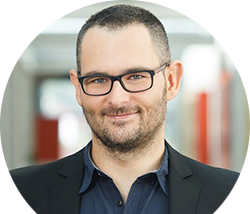
Abstract
The evolution of General AI (AGI) in medicine marks a paradigm shift from narrow, task-specific AI models to systems capable of reasoning, adapting, and autonomously making complex medical decisions. AGI aspires to integrate and synthesize vast amounts of multimodal data, adapt to new medical scenarios, and provide real-time clinical insights with human-like comprehension. The talk will examine the latest breakthroughs in multimodal AI, self-supervised learning, and real-time clinical decision-making, exploring how AGI could enhance diagnostics, treatment personalization, and drug discovery. We will also address critical challenges, including interpretability, ethical concerns, and the safe integration of AGI into clinical workflows. As we move toward more intelligent and autonomous medical AI, we must balance innovation with responsibility to ensure these advancements improve patient care and healthcare efficiency.
Biography
Prof. Zoran Bosnić received his Ph.D. from the University of Ljubljana, Slovenia in 2007. Currently, he is the head of the Chair of Artificial Intelligence at the Faculty of Computer and Information Science, University of Ljubljana. His main research is focused on machine learning, more specifically on the development of individual prediction reliability estimates, incremental learning from data streams along with concept drift detection, recommender systems, and various machine learning applications, especially in medicine, biochemistry, and insurance. In the recent period, he was involved with several medical projects, focused on cardiomyopathy risk stratification and cognitive disease predictions. Other major recent H2020 projects include SILICOFCM (In Silico trials for drug tracing the effects of sarcomeric protein mutations leading to familial cardiomyopathy) and AgroIT (Increasing the efficiency of farming through on open standards).
He serves as an editorial board member for two SCI journals: Intelligent Data Analysis (IDA) and ComSIS. His interdisciplinary teaching interests combine leading several courses: Introduction to Artificial Intelligence, Functional Programming, Computer Communications, Scientific publishing, and Incremental Learning from Data Streams. He received several teaching awards and an Honorary diploma for outstanding pedagogical and research achievements from the University of Ljubljana.
Prof. Naphtali Rishe
The inaugural Outstanding University Professor
Florida International University, USA
Title: Generative AI for Robust Map Generation from Satellite Imagery

Abstract
Maps comprised of vector tile representations of geographic features play a crucial role in geospatial analysis, navigation, urban planning, smart city development, environmental monitoring, and emergency rescue operations. Conventional map construction relies heavily on supervised machine learning methods, requiring corresponding satellite-map image pairs, an often-unrealistic expectation. Here, we will review advanced generative AI methods for map generation, as well as present deep learning algorithms developed by our team, utilizing our TerraFly Geospatial System and Satellite and Aerial Imagery Repository. One of the methodologies applied focuses on roads as a key element by developing a semantic segmentation model for road extraction from satellite imagery. This method relies on aligned input and output images, which can lead to inaccuracies when ground truth images are misaligned. A novel approach to map construction applies AI, where the model learns how to map underlying objects in satellite imagery through self-supervised techniques and generates accurate maps. In real-world scenarios, this approach may face limitations due to spectral variations in satellite imagery and the adversarial susceptibility of AI models. Our work has addressed these challenges with the goal of practical applicability. We have developed a robust map generation framework encompassing three key components. First, we have designed a novel self-supervised generative adversarial network (GAN) equipped with contrastive learning. This work marks the first application of Kolmogorov-Arnold Network (KAN) layers, replacing standard multi-layer perceptrons (MLPs) in image-to-image generation improving feature expressiveness. Second, we have developed a dual-directional AI method to translate satellite images across spectral bands and generate consistent color-channel imagery, mitigating domain variation issues. Third, we have created a forensic detection framework by integrating a large vision-language model to accurately detect generated map images, ensuring robustness against adversarial misuse. Experiments conducted with a custom dataset from the TerraFly mapping system demonstrate both the quality of generated maps and the effectiveness of forensic detection, paving the way for advanced and trustworthy map generation in real-world applications. The novel algorithms presented here were developed primarily by Arpan Mahara, a Ph.D. candidate under Prof. Rishe’s mentorship.
Biography
Dr. Naphtali Rishe is a Fellow of the U.S. National Academy of Inventors, a Professor of Computer Science, and the inaugural Outstanding University Professor at Florida International University in Miami. Rishe has been awarded $60 million in grants. Rishe has published six books and 430 papers and has been awarded 30 U.S. patents. Rishe’s geographic data management system, TerraFly, has been featured in FOX TV News, New York Times, USA Today, NPR, and the Science and Nature journals. The National Science Foundation’s annual report to Congress and its compendia of technology breakthroughs have recognized Rishe’s work on semantic and geographic database management and health informatics. Rishe received the 2021 IBM Global University Program Academic Award. More at: http://cake.fiu.edu/Rishe/.
Prof. Hermann Maurer
Fakultät für Informatik und Biomedizinisch Technik, Institut für Human-Centered Computing (HCC), Graz University of Technology, Austria
Title: Large Documents Must Allow More than Passive Reading

Abstract
When looking at a typical library of documents or books in some organization it is surprising to see that basically one can read them (a passive activity), but usually cannot do much more, like adding “annotations” (text, pictures, clips, links, etc.) for oneself or other readers without ruining the structure of the document at issue. Some first attempts (like adding comments at the end of document for all, or adding in some places notes for one self) can be observed, but the spectrum of Interactivity is very limited in all systems. The new system NID (Net Interactive Documents), used already in some large organizations is supposed to show many possible additional features and will reach a certain level of maturity by mid 2025.
In NID, in addition to ordinary annotations (also in the middle of pictures!) it is possible to ask and answer questions, to conduct discussions, but all under various control mechanisms that allow to guarantee quality, not supporting the spreading of fake news as is common in social media. Annotations can also be visible only to selected persons; search comes in many variants: as well-known full text search, as object search (like locating all pages in a document that show part of a human), searching over entire collections of documents or even search in annotations, etc.). Items in the system are analyzed by AI techniques to point to possibly related material. By introducing a special GPT system it can be restricted to use information (language independent) from well-definable quality-controlled sources.
Many of the surprising features will be shown life by accessing a major system with some 1,5 million objects and over 5.000 digitized books Austria-Forum and NID.
Biography
Prof. Dr. Hermann Maurer studied mathematics at U. Vienna from 1959. Member of Computer Science U. Calgary (Canada) 1962-63. Systems Analyst with the Government of Saskatchewan in Regina, Canada (1963); Researcher/programmer at the IBM laboratory in Vienna 1964 – 1966. Dr. phil. (Mathematics) at the University of Vienna in 1965. Staff member in Computer Science at U. of Calgary 1966 – 1971. Professor of IT at U. f Karlsruhe, 1971 – 1977; Visiting professor among others at the SMU in Dallas (USA), at the University of Brasilia (Brazil) and at the University of Waterloo (Canada).
Since 1978 full professor at the Graz U. of Technology. Has been involved in the maintenance of the team and the research and development of NID (Net Interactive Documents). (See description of plenary talk). Involved in many national and international undertakings including professor positions at U. Denver USA) , U. Auckland (Zz) and Perth (Australia).
Received numerous awards .e.g. the ‘AACE Fellowship Award”, became a foreign member of the Finnish Academy of Sciences and even board member Academia Europaea. He was awarded the Austrian Cross of Honor for Art and Science First Class, and the Grand Decoration of Honor of the State of Styria. He was awarded a number of honorary doctorates. Author of 20 books and over 800 articles in various publications.
Head of several large industrial projects, including a patented optical image memory, a “Bildschirmtext” computer MUPID, an electronic teaching experiment COSTOC, multimedia projects such as “Images of Austria” (Expo ’92 and ’93), electronic publication projects such as “PC Library” , “Geothek”, “J.UCS” and “Brockhaus Multimedial”; responsible for the development of the first 2nd generation Web Based Information Management System Hyperwave and the eLearning Suite, a modern net-based teaching platform. Manager of numerous national projects and EU projects. Successful supervision of over 400 theses, approx. 60 dissertations and habilitations.
His original research areas were compiler design, formal languages and automata, algorithms and data structures. Current research and project areas are networked multimedia / hypermedia systems, and applications in the areas of universities, exhibitions and museums, telematics services, computer networks, computer-aided new media, social effects of computers, and of course some aspects of AI. A more extensive description is found under https://austria-forum.org/af/Austria-Forum/CV_Maurer.
Prof. Alexander D. Stajković
Dean’s Professor in Business, University of Wisconsin-Madison
School of Business, USA
Title: The Role of AI in Outdating Homo Sapiens

Abstract
It is ostensibly a forgone conclusion that AI will help us be more efficient and effective in just about everything we do. More prospective thinking is needed to discuss whether there are limits to transcending human limitations by AI? In this talk, I explore the precipices upon which the human species currently stands with regard to future applications of AI and discuss the notion that homo sapiens might be on the cusp of the next step in the ontological evolution.
However, we will need to voluntarily decide to change from being homo sapiens to what we might be next. For example, as our cognitive and morphological identities get intertwined with the digital realm, we can transform through AI-enhanced bioengineering (e.g., genetically ingenerated designer babies; super-productive and obedient workers), cyborg expansion (e.g., mechanically enhanced humans), and human robotization devoid of organic chemistry.
What if some choose to upgrade to genetically or mechanically enhanced super humans and some prefer to stay good-old homo sapiens? How will the former treat the latter if the most relevant example is how we treat the chimps with only 2 percent DNA differences? It is not the best analogy, but an observable one. Transcending the biological blueprint that has defined us for millennia might deliver a shattering blow to our trek as homo sapiens, but maybe it is time?
As we contemplate this transition, technical mechanics could go wrong and unleash monsters nobody wanted or predicted. Philosophical debates of redefining the meaning of being human are needed. Humans have advanced from brutes to brilliance, and nobody tells us what to do on this Planet. But we have reached a point where a society must juxtapose what we could do with AI technology in front of us and, perhaps more importantly, what we should do going forward.
Biography
Prof. Alexander D. Stajković is a Dean’s Professor in Business at the University of Wisconsin-Madison, School of Business, and he also serves on the Faculty Board of the Tommy Thompson Center on Public Leadership at the UW-Madison. Alex was a visiting scholar in the psychology department at Stanford University, working with a legendary psychologist Prof. Albert Bandura.
Alex’s research focuses on Leadership and Organizational Behavior. His current work examines public leaders’ role in addressing societal grand challenges, which are pressing problems with ripple effects across society. His most recent book “Human Sustainability and Cognitive Overload at Work: The Psychological Cost of Working” shows that employee attentional processing capacity is maxed out and the psychological distress (e.g., work-related anxiety, depression, and suicides) is at an all-time high in the US, Europe, and Australia.
His paper on U.S. Governors’ female leadership advantage during the COVID-19 crisis received a Responsible Research Finalist Award from the Academy of Management Fellows in 2021. Alex received a Gaumnitz Distinguished Research Award (UW-Madison), a Mabel Chipman Excellence in Teaching Award (UW-Madison), and an Excellence in Teaching Award at UC-Irvine. Alex has served on the Editorial Boards of Journal of Applied Psychology (contributing editor), Academy of Management Journal, Organizational Behavior and Human Decision Processes, South African Journal of Human Resource Management, Organizational Dynamics, and as a member of the Advisory Council of Harvard Business Review.
Alex published in premier psychology and management journals such as Psychological Bulletin (IF 30.3), Journal of Management (IF 14.7), Academy of Management Journal (IF 13.6), Journal of Applied Psychology (IF 11.8), Organizational Behavior and Human Decision Processes, Personnel Psychology, Journal of Business Ethics, Journal of Organizational Behavior, and Organizational research Methods. This research generated ~16,000 citations, with the most cited article surpassing 7,000 cites.
Alex received his PhD (Organizational Behavior) and MA (Management) degrees from University of Nebraska-Lincoln, and a BSc in Economics from University of Belgrade. He has taught in the Professional, Executive, and Evening MBA programs, has conducted executive education seminars globally (e.g., Australia, Chile, China, Germany, Korea, Singapore, South African Republic), and has presented at over 100 professional conferences. For more information on Alex’s professional activities see www.stajkovic.biz.
Prof. Veljko Milutinović
Life Fellow of the IEEE, Washington, D.C., USA Member, a Former Trustee and Treasurer, Academia Europaea, London, GBR Founding Member, Serbian National Academy of Engineering, Beograd, SRB Foreign Member, Montenegrin National Academy of Sciences and Arts, Montenegro
Title: Digital Preservation of Family Heritage
Enhanced Using Artificial Intelligence
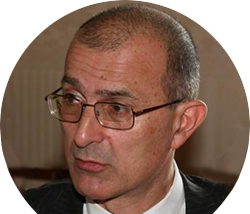
Abstract
The article presents a novel approach that enables an effective inter-generational dialogue, based on the application of Artificial Intelligence and Data Mining, tuned to The Internet and large heritage related data bases. It presents the essence and the potentials of the presented approach. It also presents two illustrative examples. Finally, it sheds light on the newly open research problems in this important and emerging filed.
Tools do exist that enable a book to be connected with ChatGPT and the other AI systems, plus with the Internet, so that the questions asked come not only from the Internet, but from the given book, too. In addition, the facts in the book could be given a higher weight, so that the answers are based on the book, but shaped with facts from the Internet, in order to derive an effective answer.
One experiment of this sort is described here, realized in cooperation of scientists from Serbia, Austria, Pakistan, and the USA. The implementation is oriented to the cell phone environment, which ensures possibly a wider application of the application described in this article, especially among the younger population that does not like to read paper books, but needs the wisdom from those books.
This is the main point: Assume that a person has a question for which the answer is in one paragraph of a 1000-page book. The person may not like to read the entire book, just to find the crucial paragraph, and especially that will not be the case if the person is in hurry. However, it is the matter of only one minute of typing, for the person to enter the question into this cell-phone application, and another up-to-a-minute to obtain the answer.
This approach is especially useful for the passing of values and wisdom from one generation to the next. Also, it could be used for inter-cultural dialogue, if proper language translators are incorporated. With proper additional explanations built into the hyper-links, inter-cultural gaps could be bridged. And finally, if a datamining system is also incorporated, hidden knowledge could be searched for and found. Some examples are given in this article.
Biography
Prof. Veljko Milutinović (1951) received his PhD from the University of Belgrade in Serbia, spent about a decade on various faculty positions in the USA (mostly at Purdue University and more recenlty at the Indiana University in Bloomington), and was a co-designer of the DARPAs first GaAs (Gallium Arsendie) RISC microprocessor at 200MHz (about a decade before commercial efforts on the same speed) and the DARPAs first GaAs Systolic Array with 4096 processors on 200MHz (both well documented in the open literature). Later, for about three decades, he taught and conducted research at the University of Belgrade, in EE, MATH, BA, and PHYS/CHEM. Now he serves as the Chairman of the Board of IPSI Belgrade (a spin-off of Fraunhofer IPSI from Darmstadt, Germany). His research is mostly in datamining algorithms and dataflow computing, with the emphasis on mapping of data analytics algorithms onto fast energy efficient architectures. For 20 of his edited books and related publications, focused forewords or condensed wisdom were contributed by 20 different Nobel Laureates with whom he cooperated on his past industry sponsored projects. He has over 100 SCI journal papers (mostly in IEEE and ACM journals), about 2000 Thomson-Reuters citations, about 2000 SCOPUS citations, and the number of Google Scholar citations that is about 5500, with the current Google Scholar indices: h=40, i10=110, i100=10, and i400=1.
Short or long courses on the subject he delivered so far in a number of universities worldwide: MIT, Harvard, Boston, NEU, Dartmouth, University of Massachusetts at Amherst, USC, UCLA, Columbia, NYU, Princeton, Rutgers, CMU, Temple, Purdue, IU, UIUC, Michigan, Wisconsin, Minnesota, etc…
Prof. Kyoung Mu Lee
Dept. of ECE, Seoul National University (SNU), Seoul, South Korea
Title: 3D Computer Vision: Reconstruction, Generation, and Manufacturing
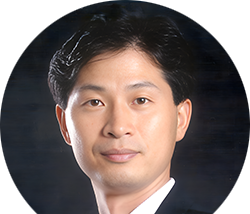
Abstract
One of the important problems in computer vision is reconstructing and understanding three-dimensional (3D) objects and scenes from images. The environment we live in is composed of 3D structures, and the ability to reconstruct and comprehend 3D information is essential for survival. Moreover, it is a crucial element in creating AI systems, such as autonomous vehicles and robots, that resemble humans. Recently, advancements in deep learning and generative Large Multimodal Models (LMMs) have enabled not only 3D reconstruction and understanding but also the generation of 3D scenes or objects. Furthermore, it has become possible to automatically manufacture these reconstructed and generated 3D objects. In this talk, we will review the past, present, and future of 3D problems and technologies in computer vision from the perspectives of 3D reconstruction, generation, and manufacturing.
Biography
Prof. Kyoung Mu Lee (Fellow, IEEE) is currently the Editor-in-Chief (EiC) of the IEEE Transactions on Pattern Analysis and Machine Intelligence (TPAMI); He is a distinguished professor at Seoul National University (SNU). He was the director of the Interdisciplinary Graduate Program in SNU. He is an Advisory Board Member of the Computer Vision Foundation (CVF). He was a Distinguished Lecturer of the Asia-Pacific Signal and Information Processing Association (APSIPA), from 2012 to 2013. He has received several awards, in particular, the Medal of Merit and the Scientist of Engineers of the Month Award from the Korean Government, in 2018 and 2020, respectively; the Most Influential Paper Over the Decade Award by the IAPR Machine Vision Application, in 2009; the ACCV Honorable Mention Award, in 2007; the Okawa Foundation Research Grant Award, in 2006, and the SNU Excellence in Research Award in 2020. He has also served as a General Chair for ICCV2019, ACMMM2018, and ACCV2018; and an Area Chair for CVPR, ICCV, and ECCV many times. He is the founding member and served as the President of the Korean Computer Vision Society (KCVS). Prof. Lee is a Fellow of IEEE, a member of the Korean Academy of Science and Technology (KAST) and the National Academy of Engineering of Korea (NAEK).
Prof. Panos Razis
University of Cyprus, Nicosia, Cyprus
Title: On the Mission of the Cosmos University in Data Science and Artificial Intelligence

Abstract
This keynote sheds light on the mission of the Cosmos University in Cyprus, and on the scope of its masters programs in Data Science and Artificial Intelligence, with respect to the upcoming High Luminocity Data in High Energy Physics. Special attention is given to the CMS experiment in high energy physics at CERN.
Biography
Prof. Panos Razis is a physisist with research interests in Data Science and Artificial Intelligence. He is a former rector of the Cyprus state owned distance learning university and the current rector of the Cosmos University in Cyprus. He published over 200 scientific articles in the world’s leading journals. The impact of his research is reflected in well over 272 thousand Google Scholar citations.
Prof. Gerhard Klimeck
Purdue University, West Lafayette, USA
Title: The Mission of NanoHUB

Abstract
The nanoHUB.org is a science and engineering gateway comprising community-contributed resources and geared toward education, professional networking, and interactive simulation tools for nanotechnology. It has been funded by the United States National Science Foundation (NSF), it is a product of the Network for Computational Nanotechnology (NCN). The NCN supports research efforts in nanoelectronics; nanomaterials; nanoelectromechanical systems (NEMS); nanofluidics; nanomedicine, nanobiology; and nanophotonics. All this is a support for the edge research in the emerging scientific fields.
Biography
Prof. Gerhard Klimeck is with the School of Electrical and Computer Engineering of Purdue University, The Director of nanoHUB, and a VicePresident of Purdue University. He is a German-American scientist, who published over 500 papers in leading periodicals, has over 25000 Google Scholar citations and the h index equal to 72.
Prof. Luca Benini
University of Bologna, Bologna, Italy
Title: Open Platforms for the Embodied AI era
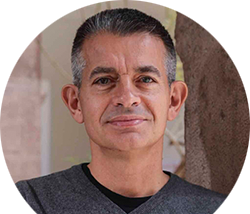
Abstract
The AI revolution is accelerating from its perception-focused origins to the generative era, where foundation models, trained on trillions of mostly unlabeled samples via self-supervision, produce multi-modal outputs such as text, sound, images. Foundation models are poised to disrupt multiple businesses. However, even more fundamental disruption will come when we will be able to “embody” these models in cars, robots, eyeglasses… To achieve this goal we need to tackle major challenges in energy efficiency, safety, security and real-time predictability of fine-tuned foundation models, while curtailing their sheer computational complexity. In this talk I will focus on designing hardware and systems for embodied AI, moving from perceptive to generative models and leveraging an open-platform approach, based on RISC-V processors and accelerators, to ensure long term sustainability, safety and security.
Biography
Prof. Luca Benini holds the chair of digital Circuits and systems at ETHZ and is Full Professor at the University of Bologna. He received a PhD from Stanford University. Dr. Benini’s research interests are in digital IC design, parallel computing and machine learning systems. He is a Fellow of the IEEE, of the ACM and a member of the Academia Europaea. He is the recipient of various awards, including the 2016 IEEE CAS Mac Van Valkenburg award, and the 2023 IEEE CS E.J. McCluskey Award.
Prof. Onur Mutlu
ETH, Zurich, Switzerland
Title: Fundamentally Accelerating Genome Analysis
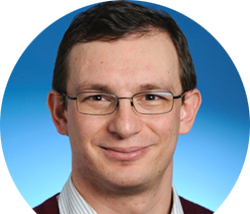
Abstract
Genome analysis is the foundation of many scientific and medical discoveries as well as a key pillar of personalized medicine. After an individual’s genome is sequenced, many computational steps are taken to reconstruct and analyze the genome. Unfortunately, these computational tasks are often very slow and energy hungry, in many cases requiring very expensive computational resources. As a result, even though sequencing technology improvements have enabled high-throughput and portable sequencing devices, like nanopore sequencers, interesting and potentially critical analyses still take days or even weeks and also cannot be performed in portable devices.
This talk describes our ongoing journey in greatly improving the performance and energy efficiency of genome analysis (with a focus on at least two major issues in genome analysis, i.e., read mapping and metagenomics analysis). We show that significant improvements are possible with both algorithmic and hardware-based approaches and their combination. We conclude with a foreshadowing of future challenges brought about by very low-cost new sequencing technologies and their potential use cases in public health, science, and medicine.
A short accompanying paper, which appeared at DAC 2023, can be found here and serves as recommended reading:
“Accelerating Genome Analysis via Algorithm-Architecture Co-Design”
https://arxiv.org/abs/2305.00492
A longer overview & survey of modern genome analysis and how to make it intelligent and efficient can be found here and also serves as recommended reading:
“Going From Molecules to Genomic Variations to Scientific Discovery: Intelligent Algorithms and Architectures for Intelligent Genome Analysis”
https://arxiv.org/abs/2205.07957
Biography
Prof. Onur Mutlu is a Professor of Computer Science at ETH Zurich. He previously held the William D. and Nancy W. Strecker Early Career Professorship at Carnegie Mellon University. His current research interests are in computer architecture, computing systems, hardware security, memory & storage systems, and bioinformatics, with a major focus on designing fundamentally energy-efficient, high-performance, and robust computing systems. Many techniques he, with his group and collaborators, has invented over the years have largely influenced industry and have been widely employed in commercial microprocessors and memory & storage systems used daily by hundreds of millions of people. He obtained his PhD and MS in ECE from the University of Texas at Austin and BS degrees in Computer Engineering and Psychology from the University of Michigan, Ann Arbor. He started the Computer Architecture Group at Microsoft Research (2006-2009), and held product, research and visiting positions at Intel Corporation, Advanced Micro Devices, VMware, Google, and Stanford University. He received various honors for his research, including the 2025 IEEE Computer Society Harry H. Goode Memorial Award “for seminal contributions to computer architecture research and practice, especially in memory systems,” 2024 IFIP WG10.4 Jean-Claude Laprie Award in Dependable Computing (for the original RowHammer work), 2022 Persistent Impact Prize of the Non-Volatile Memory Systems Workshop (for original architectural work on Phase Change Memory), 2021 IEEE High Performance Computer Architecture Conference Test of Time Award (for the Runahead Execution work), 2020 IEEE Computer Society Edward J. McCluskey Technical Achievement Award, 2019 ACM SIGARCH Maurice Wilkes Award and tens of best paper or “Top Pick” paper recognitions at various leading computer systems, architecture, and security venues. He is an ACM Fellow, IEEE Fellow, and an elected member of the Academy of Europe. He enjoys teaching, mentoring, and enabling & democratizing access to high-quality research and education. He has supervised 24 PhD graduates, multiple of whom received major dissertation awards, 15 postdoctoral trainees, and more than 60 Master’s and Bachelor’s students. His computer architecture and digital logic design course lectures and materials are freely available on YouTube (https://www.youtube.com/OnurMutluLectures & https://www.youtube.com/@CMUCompArch), and his research group (https://safari.ethz.ch/) makes a wide variety of open-source artifacts freely available online (https://github.com/CMU-SAFARI). For more information, please see his webpage at https://people.inf.ethz.ch/omutlu/.
Prof. Jon Eckhardt
University of Wisconsin, USA
Title: On the Mission of the University of Wisconsin in the Domain of Entrepreneurship and Discovery

Abstract
This keynote sheds light on the mission of the University of Wisconsin, and on the scope of its future programs in Entrepreneurship enhanced with Essentials of Management and Artificial Intelligence.
Biography
Prof. Jon Eckhardt is a Vice President of the University of Wisconsin, with research interests in Interdisciplinary Discovery and Artificial Intelligence. He published over 100 scientific articles in the world’s leading journals. The impact of his research is reflected in about 6000 Google Scholar citations.
Chair:
- Nenad Filipović, University of Kragujevac
Local Organization:
- Ognjen Pavić, University of Kragujevac
- Lazar Dašić, University of Kragujevac
- Đorđe Dimitrijević, University of Kragujevac
- Đorđe Ilić, University of Kragujevac
- Teodora Jeremić, University of Kragujevac
- Filip Filipović, University of Kragujevac
- Milica Kaplarević, University of Kragujevac
- Milena Đorđević, University of Kragujevac
- Marija Gačić, University of Kragujevac
- Neda Vidanović Miletić, University of Kragujevac
Scientific Board:
- Tijana Geroski, University of Kragujevac
- Bogdan Milićević, University of Kragujevac
- Aleksandra Vulović, University of Kragujevac
- Igor Saveljić, University of Kragujevac
- Miljan Milošević, University of Kragujevac
- Boban Stojanović, University of Kragujevac
- Miloš Ivanović, University of Kragujevac
- Vesna Ranković, University of Kragujevac
- Vladimir Ranković, University of Kragujevac
Honorary Consultants:
- Miloš Đuran
- Miloš Kojić
- Veljko Milutinović
Organizing Committee:
- Martin Aleksandrov (TU Berlin, Germany)
- Sandra Avila (University of Campinas (Unicamp), Brazil)
- Christian Blum (Spanish National Research Council (CSIC), Spain)
- Carlos Cardonha (University of Connecticut, United States)
- Vinay Chaudhri (United States)
- John Chinneck (Carleton University, Canada)
- Andy Chun (City University of Hong Kong, Hong Kong)
- Andre Augusto Cire (University of Toronto, Canada)
- Bradley Clement (Jet Propulsion Laboratory, United States)
- Dubravko Ćulibrk (University of Novi Sad, Serbia)
- Veljko Milutinović (University of Kragujevac and University of Belgrade, Serbia)
- Diane Cook (Washington State University, United States)
- Gabriella Cortellessa (CNR-ISTC, National Research Council of Italy, Italy)
- Lizhen Cui (Shandong University, China)
- Akay Metin (University of Houston, USA)
- Allen Robert (University of Southampton, UK)
- Zoran Bosnić (University of Ljubljana, Slovenia)
- Zlatan Car (Univeristy of Rijeka, Croatia)
- Ciaccio Edward (Columbia University, USA)
- Themis Exarchos (University of Ioannina, Greece)
- Dimitrios Fotiadis (University of Ioannina, Greece)
- Nikola Jorgovanović (University of Novi Sad, Serbia)
- Zoran Marković (IIT, Serbia)
- Michalopoulos George (University of Pittsburgh, USA)
- Nikita Konstantina (National Technical University of Athens, Greece)
- Zoran Obradović (Temple University, USA)
- Ouzounis Christos (King’s College, UK)
- Pattichis Constantinos (University of Cyprus, Cyprus)
- Sheu Phillio (University of California, USA)
- Stojanović Radovan (University of Montenegro, Montenegro)
- Miroslav Trajanović (University of Niš, Serbia)
- Tsiknakis Manolis (Hellenic Mediterranean University, Greece)
- Yang Guang-Zhong (Imperial College London, UK)
- Zervakis Michalis (University of Crete, Greece)
- Andre de Carvalho (University of São Paulo, Brazil)
- Luca Di Gaspero (DPIA – University of Udine, Italy)
- Matthew Gaston (Carnegie Mellon University, United States)
- Carmen Gervet (Université de Montpellier, France)
- Odd Erik Gundersen (Norwegian University of Science and Technology, Norway)
- Koen Hindriks (Vrije Universiteit Amsterdam, Netherlands)
- Neil Jacobstein (Singularity University, United States)
- Binbin Jia (Southeast University, China)
- Elias Khalil (Georgia Institute of Technology, United States)
- Lars Kotthoff (University of Wyoming, United States)
- Hoong Chuin Lau (Singapore Management University, Singapore)
- Jimmy Lee (The Chinese University of Hong Kong, Hong Kong)
- Lee Mccluskey (University of Huddersfield, United Kingdom)
- Felipe Meneguzzi (Pontifical Catholic University of Rio Grande do Sul, Brazil)
- Mitra Nasri (Delft University of Technology, Netherlands)
- Barry O’Sullivan (University College Cork, Ireland)
- Michael Orosz (University of Southern California Information Sciences Institute, United States)
- Simon Parsons (University of Lincoln, United Kingdom)
- Andrew Perrault (Harvard University, United States)
- David Pynadath (University of Southern California, United States)
- Claude-Guy Quimper (Laval University, Canada)
- Howard Shrobe (Massachusetts Institute of Technology, United States)
- Madhav Sigdel (University of Alabama in Huntsville, United States)
- David Stracuzzi (Sandia National Laboratories, United States)
- Dimitris Stripelis (University of Southern California, United States)
- Nirmalya Thakur (University of Cincinnati, United States)
- Kevin Tierney (Bielefeld University, Germany)
- Michael Trick (Carnegie Mellon University, United States)
- Pradeep Varakantham (Singapore Management University, Singapore)
- Deng-Bao Wang (Southeast University, China)
- Shinjae Yoo (Brookhaven National Laboratory, United States)
- Yingqian Zhang (Eindhoven University of Technology, Netherlands)
- Dubravko Ćulibrk (University of Novi Sad, Serbia)
- Jovan Stojanović (Serbian AI Society, Serbia)
- Stefan Badža (Serbian Government, Serbia)

